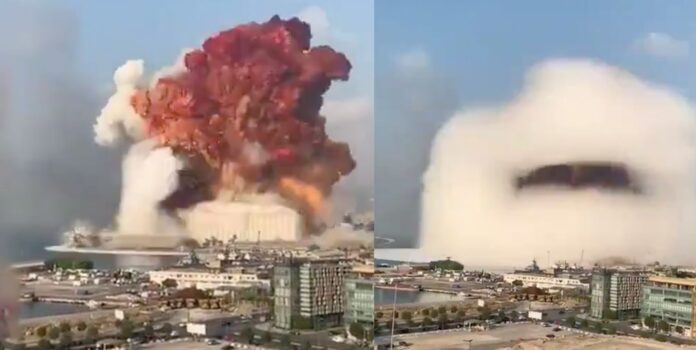The 4th of August marks the third anniversary of the spark that ignited nearly three tons of ammonium nitrate—a chemical used in agricultural fertilizers as well as bombs—destroying most of Beirut’s pier, and causing catastrophic damage. Though dubbed Lebanon’s 9/11 at the time, the news will go mostly unnoticed. It’s no surprise. The 2020 Beirut explosion fits into no larger struggle but the country’s slow, intimate, and self-contained dissolution. Lebanon might be the occasional stage of Iran, Israel, and Syria’s discrete feuds and subsidiary geopolitical outbursts but the explosion was different. The explosion was a cruel misfortune, and bad luck fails to command steady attention. Our interest behaves the way fate: quick, erratic and evanescent.
In her essay “Regarding the Pain of Others,” Susan Sontag explains how some, but not all, disasters and crises in the 20th century “were guaranteed the attention of many cameras because they were invested with the meaning of larger struggles.” The Spanish Civil War was a stand against the fascist menace. The ongoing conflict between Israeli Jews and Palestinians carries the resonance of the Nazi extermination of European Jewry and is infused with geopolitical stakes given the support the United States gives to the state of Israel. In comparison, she writes, the Indian and African famines or the Chisso Corporation dumping mercury-laden waste in the Minamata Bay don’t garner the same attention as wars. Wars continue to be the larger structures in the landscape of History.
Unlike continent-wide famines or corporate crimes, however, the Beirut explosion adds a rung to the strange hierarchy our attentions assign to sufferings. Pain brought about by mistakes, however unfortunate and devastating, fail to engage us. A crisis is only as captivating as its moral potential. If we can find the culprit, assign blame and conceive of the preventability of a catastrophe, its hold on our imaginations loosens. Wars might seem preventable but only in theory. Reading history or the news, they seem intractable, as if stakes and interests chart an inviolable outcome. Beirut’s pier explosion was preventable. A government with a strong record of shortcomings can be singled out as the culprit. And so the global news consumer pouts and scrolls on. The event becomes a B-movie in the large cinematographic ark of the decade, and Beirut an island of suffering, a black hole of pain.
I left my native Beirut 17 years ago and have been a US resident for the last seven. I wonder whether my and others’ chosen exiles were partly driven by a desire to be part of suffering that matters. 9/11 is the jarringly painful blockbuster of the century’s disasters. It is etched in the surviving species’ memory. Beirut’s explosion will not be. Nor will the Lebanese Civil War, the battle of the Hotels, the “Grapes of Wrath” operation and the 2000 and 2006 wars with Israel that scarred my childhood. To live in the global South is to live South of History, the dark side of the moon of our collective memory. Maybe my migrancy was a fleeing from historical anonymity. During college in Paris, I felt existentially safer, as if the Sorbonne’s centuries-old stones offered a firmer sense of belonging. History might be the calcification of memory but it is the most legible record of our beingness. To know our suffering is inscribed in a larger narrative soothes a neighborhood in the city of existential angst we host inside.
History as mother: Maybe our bodies know its arms are a refuge against the wear of time. Historical consequence is a form of existential embrace, a guarantee that our lives matter at some scale. In this definition, History is not a backwards looking retrospective exercise but a collective momentum. It is reality experienced with communal density and weight. We want to live in a substantial reality, to know that our experience has a body that is neither diaphanous nor ethereal. To know that our stories are impressed on a stone slate that arrests passersby. And to be assured we are not alone, that our grief will be spread not only within our contemporary community but beyond.
In Lafcadio’s Adventures, Andre Gide writes “History is fiction that did happen. Fiction is history that might have happened.” Gide forgets the privilege of perspective. How smaller histories—ones that aren’t infused by the potency of larger struggles, aren’t morally charged or complex and hence cannot hold our attention—teeter on the brink of fiction, slowly fade into a collective imaginarium where psyches staring at a mushroom cloud blur, squint, and ponder whether this is Hiroshima, some nuclear experiment in a desert somewhere, or that explosion that happened at a pier in the Middle East once.





